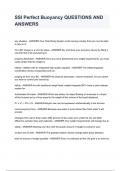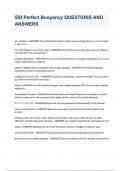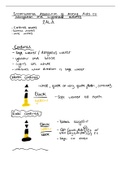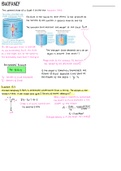Buo Guides d'étude, Notes de cours & Résumés
Vous recherchez les meilleurs guides d'étude, notes d'étude et résumés sur Buo ? Sur cette page, vous trouverez 47 documents pour vous aider à réviser pour Buo.
Page 2 sur 47 résultats
Trier par
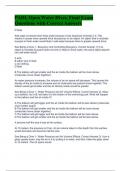
-
PADI, Open Water Diver, Final Exam Questions with Correct Answers
- Examen • 20 pages • 2024
-
Disponible en pack
-
- €13,27
- + en savoir plus
D float. Salt water is heavier than fresh water because it has dissolved minerals in it. This means it causes more upward force (buoyancy) on an object. An object that is neutrally buoyant in fresh water would float in salt water because there is greater upward force. See Being a Diver I - Buoyancy and Controlling Buoyancy. Correct Answer 1) If an object is neutrally buoyant (does not sink or float) in fresh water, the same object placed into salt water would A sink. B either sink or ...
SSI Perfect Buoyancy QUESTIONS AND ANSWERS
SSI Perfect Buoyancy QUESTIONS AND ANSWERS
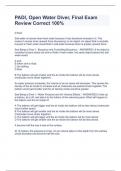
-
PADI, Open Water Diver, Final Exam Review Correct 100%
- Examen • 20 pages • 2023
-
Disponible en pack
-
- €18,02
- + en savoir plus
D float. Salt water is heavier than fresh water because it has dissolved minerals in it. This means it causes more upward force (buoyancy) on an object. An object that is neutrally buoyant in fresh water would float in salt water because there is greater upward force. See Being a Diver I - Buoyancy and Controlling Buoyancy. - ANSWERS1) If an object is neutrally buoyant (does not sink or float) in fresh water, the same object placed into salt water would A sink. B either sink or float....
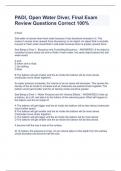
-
PADI, Open Water Diver, Final Exam Review Questions Correct 100%
- Examen • 20 pages • 2023
-
Disponible en pack
-
- €11,38
- + en savoir plus
D float. Salt water is heavier than fresh water because it has dissolved minerals in it. This means it causes more upward force (buoyancy) on an object. An object that is neutrally buoyant in fresh water would float in salt water because there is greater upward force. See Being a Diver I - Buoyancy and Controlling Buoyancy. - ANSWERS1) If an object is neutrally buoyant (does not sink or float) in fresh water, the same object placed into salt water would A sink. B either sink or float....
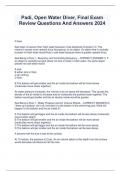
-
Padi, Open Water Diver, Final Exam Review Questions And Answers 2024
- Examen • 20 pages • 2024
-
Disponible en pack
-
- €14,70
- + en savoir plus
Padi, Open Water Diver, Final Exam Review Questions And Answers 2024 D float. Salt water is heavier than fresh water because it has dissolved minerals in it. This means it causes more upward force (buoyancy) on an object. An object that is neutrally buoyant in fresh water would float in salt water because there is greater upward force. See Being a Diver I - Buoyancy and Controlling Buoyancy. - CORRECT ANSWER-1) If an object is neutrally buoyant (does not sink or float) in fresh water...
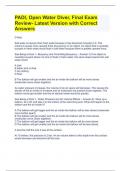
-
PADI, Open Water Diver, Final Exam Review- Latest Version with Correct Answers
- Examen • 20 pages • 2023
-
Disponible en pack
-
- €15,65
- + en savoir plus
Salt water is heavier than fresh water because it has dissolved minerals in it. This means it causes more upward force (buoyancy) on an object. An object that is neutrally buoyant in fresh water would float in salt water because there is greater upward force. See Being a Diver I - Buoyancy and Controlling Buoyancy. - Answer-1) If an object is neutrally buoyant (does not sink or float) in fresh water, the same object placed into salt water would A sink. B either sink or float. C do nothi...
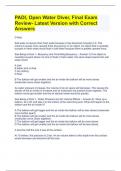
-
PADI, Open Water Diver, Final Exam Review- Latest Version with Correct Answers
- Examen • 20 pages • 2023
-
Disponible en pack
-
- €11,85
- + en savoir plus
PADI, Open Water Diver, Final Exam Review- Latest Version with Correct Answers D float. Salt water is heavier than fresh water because it has dissolved minerals in it. This means it causes more upward force (buoyancy) on an object. An object that is neutrally buoyant in fresh water would float in salt water because there is greater upward force. See Being a Diver I - Buoyancy and Controlling Buoyancy. - Answer-1) If an object is neutrally buoyant (does not sink or float) in fresh water...
Revision notes for reigion A and reigon B IALA Buoyage system. Basic background information used to practice towards OOW orals preparation or foundation degree.
Notes from lecture and textbook with practice problems and answers

